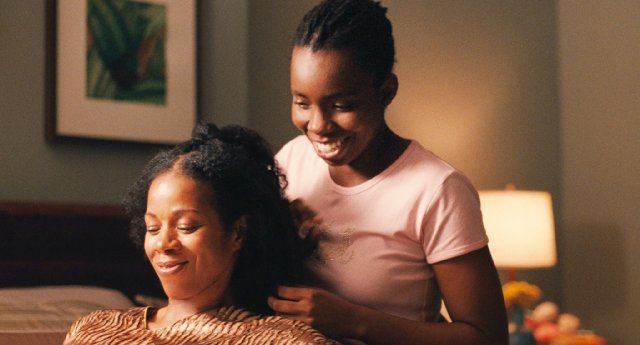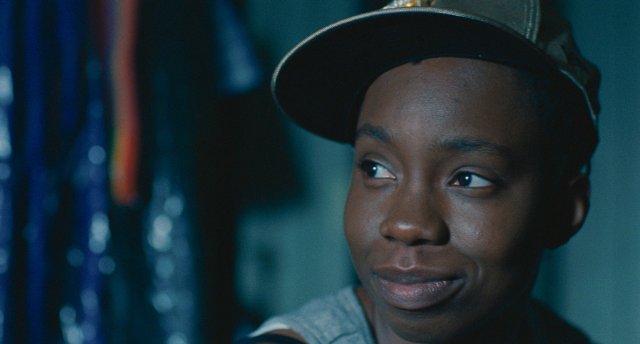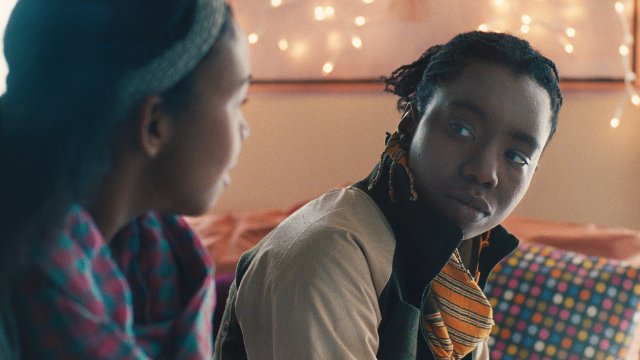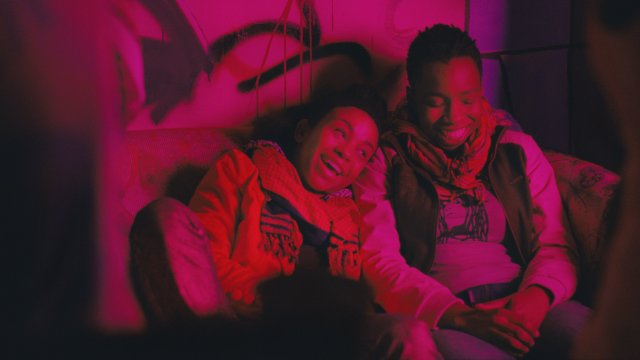Though
Pariah
is this little film telling a simple, classic tale seen and heard
before, the charm of its actors and the need to have this
coming-of-age story told again and again until it no longer needs to
resonate makes the film a powerful and award-worthy statement.
Relative
newcomer
Adepero
Oduye portrays
Alike
(pronounced
ah-LEE-kay),
a 17-year-old
African-American
woman who lives with parents
Audrey
and
Arthur (Kim
Wayans and
Charles
Parnell), and younger sister
Sharonda
(Sahra
Mellesse) in
Brooklyn’s
Fort
Greene.
With a flair for poetry and good grades, Alike quietly but firmly
embraces her lesbianism with the sometimes boisterous support of her
best friend and out lesbian
Laura
(Pernell
Walker).
At home, her
parents’ marriage is strained and there's further tension in the
household whenever Alike’s development becomes the topic of
discussion. Pressed by her mother into meeting a colleague’s
daughter, Alike – who desperately seeks a first love – unexpectedly
finds Bina
(Aasha
Davis) refreshing to be with, but it ends with
disappointing results.
Wondering how
much she can confide in her family, Alike struggles to get through
adolescence with grace, humor, and tenacity – sometimes succeeding,
sometimes not.
A rousing
success at the 2011
Sundance
and
Toronto
Film
Festivals,
Pariah is the feature-length expansion of
writer/director
Dee Rees’
award-winning 2007 short film. At Sundance, its cinematographer
Bradford
Young
won the U.S. Dramatic Competition's Excellence in Cinematography
Award.
Rees and
partner/producer Nekisa
Cooper managed to enlist the aid of such veterans as
Spike Lee to join the feature’s executive producing
team, and overcame the challenges of making a mirco-budgeted
contemporary drama full of such authenticity and grit.
Oduye recently
spoke with a trio of journalists prior to the
New York
opening of the film, shortly before she was nominated for
the 2012
Independent
Spirit Award for Best Female Lead.
 What
were your expectations working with a first-time director and
producer?
What
were your expectations working with a first-time director and
producer?
It started as
a short in '06, and usually with student films, the process is a
little crazy – all over the place – because they're trying to figure
it out. So my first impression of them was, "Wow, they are so
organized." From the minute I walked in, I was like, "Oh, this is
something unlike anything I've ever done." Then in doing the actual
short, it proved to be this amazing experience with people who were
at the top of their game. I felt like I was surrounded by really
great, talented energy. That experience in and of itself was
amazing. So everything else that's happened has been extra icing on
an already amazing, tasty cake. It's been really interesting. And
because the journey has been about five years, it's surreal and
overwhelming, but in a good way. Everyone's worked really hard, so
it's really nice.
Were you shocked about their corporate background?
It’s always
like, really? Really? But it's a testament to people who take a
chance on their dreams and their goals. You leave something very
secure, like working for Colgate-Palmolive, to do filmmaking and
then this is all happening. It's affirming.
You’ve taken a circuitous route to being an actor as well. Weren't
you studying medicine?
I went to
Cornell and was pre-med. Since I was four, I was
going to be a doctor. My father passed away when I was a junior, and
it was a wake-up call. He was young and it was sudden, and I
realized I was doing it for him. I asked myself one day, "Well, what
is it I would really like to do?" And acting came up. I was like,
"Really? Okay." So I took an acting class my senior year, because
that was the year I could take other classes – it was the only time
I could take other classes. It was the only class that I took at
Cornell that I absolutely loved, and it was the kind of challenge I
always wanted to throw myself into. I graduated and said, "Okay, I'm
going to be an actor." I didn't know any actors, didn't know
anything about acting, and I just started from the bottom. I just
figured it out and studied with some teachers.
Did you have that same leap-of-faith moment that Dee described when
she left the corporate world and was going to make films?
My mother was
very concerned. Very concerned.
 About
acting in general or this film?
About
acting in general or this film?
About acting
in general. My parents are
Nigerian,
and so my mother is, "We want you to go to school and get a good
job" and all this stuff. She doesn't know anything about acting, but
instinctively she knew that it was going to be really challenging.
It's not an easy field to step into. What I had to overcome were a
lot of things in my own head. I thought, wow, this is really crazy.
But in spite of thinking those thoughts, I kept going because I knew
in my heart I felt like I belonged. And I thought, I'm not really
cookie cutter, I'm not this, I'm not that. But I just know this
feeling, and I know when I would work for free as an extra on
movies. I thought, this is the best thing ever, and I can do this
for free all my life. I knew that's what I wanted to do. I just held
true to my dreams for my life and I kept on going. There were times
where I was like, I could have just [gone] straight on, been a
doctor, and everything would be cool. But I wouldn't be happy.
You've been doing acting now for how long, how many years?
I would say
I've been acting, really hardcore, for about seven, eight years.
You aren’t the model of the typical black woman in Hollywood that’s
usually been seen on screen.
People have
said things to me in terms of suggestions, strong suggestions, of
what I should do to make it easier for myself in terms of hair, or
[about my] name. I've heard all kinds of crazy things. And I get
that it's coming from a place of "we know what it's like, so if you
do this, it's going to make it a lot easier for you." But I knew
from the beginning that it's either going to happen as myself or not
at all. I always just knew that. I'm much more comfortable as myself
and not trying to be someone else. I struggled a lot in the
beginning because I was trying something that's kind of
impossible, almost. I remember one time, a girl in my acting class
was like "Adepero, you're so lucky because you're so unique." It
kind of hit me and I was like, "That's what it's going to be." It's
because I'm unique – [that] is going to make me stand out, and if I
just stay true to who I am, then it'll all be fine. That's what I
say to people: it's better to be yourself. Instead of trying to
predict what people want you to look like so that you might be
successful, just start from where you are. So for me, I believe that
to be true.
Do you feel the need to balance staying true to yourself with
protecting yourself in terms of questions people will ask you about
your sexual identity in relation to this character?
In the
beginning, I did. I was very defensive: why are you asking me that?
And I think it's natural. People want to know how old you are,
people want to know if you're gay or straight, people want to know.
In the beginning, I was like, well why are you asking me, because if
I am gay, does that mean that it's not really acting, that it's kind
of easier for me? Or if I'm not gay, does that mean I don't know?
But I just let that down, and I get why people want to know.
 What
was your preparation to play this part?
What
was your preparation to play this part?
As an actor, I
love to do research, so I'm open to reading and watching anything
that thrusts me into whatever world. It's great that Dee was like
that, too, and so she gave me some books to read. I read
Zami
by
Audre Lorde. How I related to the film immediately
was, I knew what that felt like to not feel free, to feel kind of
held back by your environment, by conditioning, all of that. So when
we went to that lesbian party, it was very, very specific. I went
with Pernell Walker, who plays Laura, and she was dancing with women
and getting numbers and I was odd man out. I was invisible because I
didn't fit in. [It was] a club with women, all women, but it was
male-identified women or female-identified women. It was like butch
or femme, and I felt like I was at a regular club with men and
women, though it was just all women. So it was like, "Wow. I'd never
been in that environment before." It really made Alike and Laura's
world very specific and [showed] why she feels completely left out.
Because she doesn't fit in any of those worlds.
Were you in character?
Yeah, we had
to go in character.
Do you remember what club it was?
It's a monthly
party. I don't know if it still happens now, but it was called
Lovergirl, in New York City. It was a great party.
What do you think about Nollywood, and did that help inform your
sense of alienation?
Yeah. I know
what it feels like to not feel like I belong, just growing up in
Brooklyn and feeling different.
You’re a lot more glamorous than your character.
People were
confused by what they've seen or what people have done before, and
so they're like, "Oh, you could be an ingénue, maybe a character."
It's a lot of what they've seen before.
But then you take a part that puts you in the spotlight which really
un-glamorizes you. There must have been a little conflict.
Not at all,
because what I dream of is doing really amazing roles and amazing
films that are well-written with amazing people. So any chance to
throw myself into a really well rounded character, that's the dream.
For me it was exciting, it was like the best thing ever. I get to be
on set every day and play this teenager trying to figure it out.
 And
on camera almost the entire film.
And
on camera almost the entire film.
Yeah, which is
challenging, but it's what I've been wanting to do for a long time.
I loved it.
Would you do anything in Nollywood?
If it was
something to my liking, yeah. Sure.
You could do an action film.
I'd love to do
an action film.
So we're going to have to suggest you for an action-adventure.
How now. Let's
do it.
If you had one to pick, what one would you want to be in? Would you
do science-fiction, or be in a James Bond film?
I would like
to be in a James Bond film, but the female character couldn't be
very like, "Oh, James Bond." She'd have to be really kickass.
Not the damsel in distress.
Yeah, but
something really great. I love
Mission:
Impossible too.
Do you have any comic book costume hero you'd want to be like Wonder
Woman?
I would love
to be Wonder Woman if they would let her be black.
How does your mother think about it, now that she's seen you doing
this?
She's excited
and happy. She's going to actually see the film this week for the
first time. She came from
Nigeria,
so she's very excited.
Since the success of this film, what other opportunities has this
provided for you? Do you have anything in the works?
Since the film opened at
Sundance, I have a really great team of people, a manager and a
publicist, so I have people who are on the same page as to what I'm
interested in. And I've been reading a lot of scripts so far, so
we'll see.
Email
us Let us know what you
think.